Ai-jen Poo and Tarana Burke
The Future of Hope 5
The visionary, next-generation organizer Ai-jen Poo says this of Tarana Burke: “There are just so many layers of hope that she brings to the world and to people like me, to survivors, to all kinds of communities.” Ai-jen and Tarana are the conversation partners for this episode of The Future of Hope. And what a conversation it is. We listen in on a brilliant friendship that has powered and sustained two extraordinary women who are leading defining movements of this generation that call us to our highest humanity. Ai-jen spoke with Krista in 2020 for our episode, “This Is Our (Caring) Revolution,” and is back as host for this conversation. She has been long ahead of a cultural curve we are all on now — of seeing the urgent calling to update and transform not just how we value the caregiving workforce of millions, but how we value care itself as a society. Tarana founded the ‘me too.’ Movement. What you are about to hear is intimate, revelatory, and rooted in trust and care. It’s also an invitation to all of us, to imagine and build a more graceful way to remake the world.
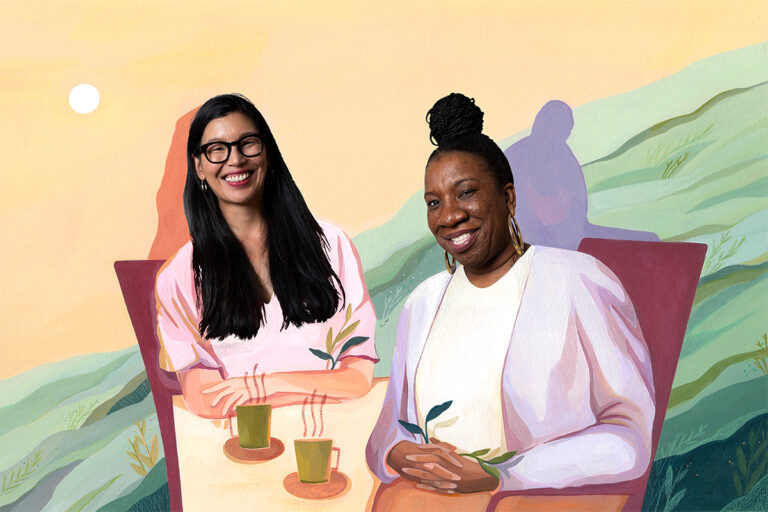
Image by Ifada Nisa , © All Rights Reserved.
Guests
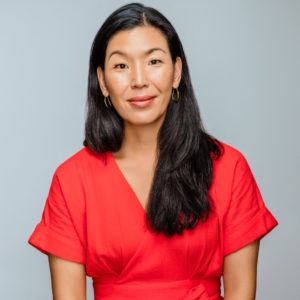
Ai-jen Poo co-founded and leads The National Domestic Workers Alliance, is the director of Caring Across Generations, and co-founder of Supermajority. Among her countless awards, she was a 2014 MacArthur Fellow. She’s the author of The Age of Dignity: Preparing for the Elder Boom in a Changing America.
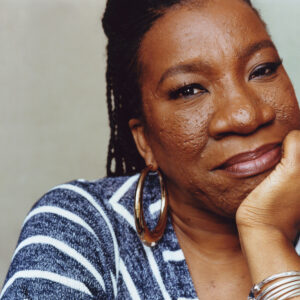
Tarana Burke has been organizing within issues facing Black women and girls for over three decades. Her many accolades include the 2019 Sydney Peace Prize and the Gleitsman Citizen Activist Award from Harvard’s Center for Public Leadership. She’s the author of Unbound: My Story of Liberation and the Birth of the Me Too Movement.
Transcript
Transcription by Heather Wang
Krista Tippett, host: The visionary Ai-jen Poo said this to me, of Tarana Burke: “There are just so many layers of hope that she brings to the world and to people like me, to survivors, to all kinds of communities.” Ai-jen and Tarana are the conversation partners for this episode in our series The Future of Hope. And what a conversation it is. We listen in on a brilliant friendship — a friendship that has powered and sustained two extraordinary women, who are leading defining movements of this generation in time that call us to our highest humanity.
Ai-jen, as you might remember from my conversation with her in early 2020, has been long ahead of a cultural curve we are all on now — of seeing the urgent calling to update and transform, not just how we value the caregiving workforce of millions, but how we value care itself, as a society. She cofounded and leads the National Domestic Workers Alliance. She and Tarana first intersected in 2018, a year after the quiet beginnings of ‘me too’ got very loud, as the revelations about Harvey Weinstein and others burst into public view. ‘me too’ in its fullness, as Tarana has said, is a statement that: I’m not ashamed, and I’m not alone — and, from survivor to survivor: I see you, I hear you, I’m here for you, and I get it.
What you are about to hear is intimate, revelatory, and rooted in trust and in care. It’s an invitation, too, asking all of us to imagine and build a more graceful way to remake the world.
[music: “Seven League Boots” by Zoë Keating]
I’m Krista Tippett, and this is On Being.
This conversation came together as things do now, over Zoom, with Ai-jen in Chicago and Tarana in Baltimore.
Ai-jen Poo: All right.
Tarana Burke: It’s just you and me, kid.
Poo: It’s just me and you — what I’ve been waiting for.
So how are you, by the way?
Burke: I’m OK. I have become one of those people that I used to talk about, now — I am a plant person. I went from the person that killed plants to having like, 75 plants in my house.
Poo: Are you serious? 75 plants?
Burke: No, I am that person. I do. It sounds crazy, like I have a jungle, but they’re spread out. I have really little ones; I have big ones. So that’s my relaxation now. So I have like, an app on my phone.
Poo: Ohhh, you’re a plant lady.
Burke: I’m a plant lady now.
Poo: This is amazing.
Burke: Yeah, I’m really excited about it.
Poo: I mean, of all the things you could be doing.
Burke: That’s what I’m saying. [laughs]
Poo: We are going to put a pin on that and come back to that. We’re overdue for a catch-up, on so many levels.
Burke: Yeah, clearly. [laughs]
Poo: But today, we are going to talk about hope.
Burke: It feels like that word just washes over you, right? [laughs] You hear “hope,” it’s like, oh, that’s a good one — ah.
Poo: It’s a good word. It’s a really good word. And when I was just thinking about, preparing for this conversation, the reason why I wanted to do it with you is because there are just so many layers of hope that you bring to the world and to people like me, to survivors, to all kinds of communities that you have no idea. [laughs] But I wanted to just explore that, because I don’t know how much you’ve really thought about that. And, well, what I thought at the beginning of this year was like, everybody was so tired from last year and the four years before that, and kind of traumatized and dealing with so much loss from COVID and all the disruptions in our lives. And there was a way in which people entered this year, it felt like from a place of doom and gloom. Like everybody was being really negative about elections, really negative about this administration, really negative about so many things, and I just thought, this is not going to work. [laughs] This is not going to work out for us, and this vibe is not a winning vibe.
And so if we are going to do what needs to be done, this year or any year, we have to figure out how to channel hope. And so I just decided at the top of 2022 that I was going to be militant about hope and cultivating hope. And so that’s where I am, is like, [laughs] we have to channel it, we have to generate it. And one of the things that I thought about in preparing for this conversation with you, is just the fact that you and I are of the same age, same generation, and we never knew each other, really, in New York, even though we came up —
Burke: I know, and we’d come up around the same people.
Poo: The same people, the same generation, the same movements, the same mentors. [laughs]
Burke: It’s so interesting.
Poo: It’s so interesting that our first conversation was after I was 45 years old, in 2018. And one of the things that made me so hopeful about that is you became one of the most important people in my life, overnight in ’18, and I went from my whole life without being in any kind of relationship to you, and imagine —
Burke: And you were like —
Poo: Like, that makes me hopeful, because there are probably other incredible souls who will change your sense of what’s possible and will change your life in such beautiful ways, that are still out there, that we have yet to meet. You remind me of that. So that’s another one of the reasons why I’m so excited to talk to you today.
Burke: That’s such an incredible sentiment. But I do — I feel like that about our little group in general. Like, that became — and even just all the things that happened. Nobody — I don’t want to say “nobody”; that’s such an exaggeration. But it was just so hard to do this work, and it always felt like an uphill battle in a vacuum. And it would always be — the winds would always be little blips on a map that felt good to us, and it felt good to survivors. And we always had to try to make them feel bigger [laughs] than they were, to try to generate hope, to try to generate more hope to keep people in the game and keep them moving forward, while trying to mitigate our feelings of feeling this “how do we continue to do this, and how do we continue to generate the energy to keep going, when we know we have so far to go and such a mountain to climb?”
And then 2017 came like lightning, and it was like, wow, not only is this possible, but it’s sort of like when you kick over an ant farm or something, or you kick over —
Poo: And you’re like, whoa! [laughs]
Burke: You’re like, oh, shoot, that’s not just — there’s like, thousands of us. There’s millions of us. It was not just like lightning struck, but then you found all of this community. That was — you talk about finding hope, it was like, I feel like that about not just the way that moment happened, but there are several moments like that, but certainly finding community in the work that we do was big. Big, big, big, big, big. As I say this to you all the time, I could not have possibly made it through the last four or five years without our sisterhood. No way possible. No way.
Poo: Same. Same.
Burke: Yeah, no way possible.
Poo: It was an era of some of the biggest transformations, in the world and in ourselves, and there was no way we were going to do it without each other — [laughs] just no way.
Burke: No. No. Just, yeah, no. [laughs] People could never understand — no.
Poo: That’s right. I’m curious about — you mentioned — I think that that is so true, the way you’ve described it, of our whole job has been to help small groups of people break out of the isolation of their experience, or individuals — individual survivors, individual domestic workers — break out of the isolation of their experience, find community and connection; then we build these small communities of connection.
But then we know that there’s millions more people out there, and sometimes, for years, it can feel like a tree falling in the wilderness. Like, this group may have built community and found each other, and that is so important, and it’s a miracle in and of itself — and it isn’t what we need, if we’re going to disrupt the status quo and build something different.
Burke: Exactly.
Poo: We need it to not feel like a tree falling in the wilderness, but actually …
Burke: All the trees falling. [laughs]
Poo: All the trees, all the trees. And I’m curious, in your journey, what the role of hope has been in that process.
Burke: It sounds corny, I guess, when you say it, because people have made — have watered it down and I think overuse it, and I think it didn’t help that it was Obama’s slogan, [laughs] you know? But it really is the driving force. It’s all we have to keep going, because this work is just so hard, and the — what we are trying to achieve is so big. And we don’t have any idea — [laughs] you know, you get a big win or you achieve — you move the needle a little bit, you impact the narrative, whatever the thing is. You get this big, huge thing. Your work goes viral, [laughs] right? And you’re like, my gosh, that’s incredible.
You can only hope to have that kind of impact, right? I remember very, very clearly that day of writing down my hopes for this work in a notepad, in a steno pad. I had zero dollars, [laughs] both personally and to put towards this work. I had zero connections in the world. I had my community, I had the people around me, but I knew clearly that it had — I could see sort of the writing; like, what would it take. I knew that I had to get a bigger platform. I knew that different people than me had to talk about this, people who other people listened to. So I knew that. I remember the names that I wrote down, of like, celebrities and things like that that I wished would talk about this. I knew that I was moved by Oprah’s story and listening to her talk about it, so what if she did this? I knew — like we would use Gabrielle Union and Mary J. Blige and all these other people, in school, in our classrooms, to tell their stories. I could only hope to get people like that interested in telling their survivor stories and dealing with little Black girls. But you just keep doing it, hoping that you can get somebody.
So our whole setup is like, 90 percent hope, [laughs] you know what I mean? And that is that you can work hard enough, plan big enough, just — you do all the work, and then you just really, really, really hope that it’s good enough, important enough, big enough, strong enough, all of those things. And you’ve got to keep that sort of in front of you. And that’s it. The rest of it is just the work. You’re just working, working, working, working, working, working, working, and hoping for a miracle.
Poo: I love that formula. It’s like: Do the work, plus hope, equals miracle.
Burke: Exactly. [laughs] Exactly.
Poo: You know what that makes me think about is the fact that you were, long before the viral moment, you were already thinking about, like a true organizer, like, what if Gabrielle Union did this? And what if Oprah did this? And what if — and kind of connecting those dots. And to me, there is something so powerful about the creativity of hope, and that if — it’s the base or the root of how we as organizers are able to be creative. If you are cynical and you are negative and you don’t believe that winning is possible, there’s no way to be creative. And the kind of creativity that’s required to address any of the problems that we’re dealing with, it’s just like, extraordinary. So I just, it’s that relationship between hope and creativity I feel like is perfectly illustrated in your example just now.
Burke: You know what’s so funny? When I look back — I have this box of stuff, right? And I have in this box — so I was about 28, 29 when I first started getting into this, and — which is obviously a fully grown adult. But now that I’m almost 50, I’m looking back at that as like, a kid. [laughs] But I was just like, I was certainly hopeful and optimistic and not cynical, because I was writing letters to these people. I would go online and find the record label or the so-and-so —
Poo: [laughs] This is amazing.
Burke: [laughs] And so I have these letters that I wrote to Fantasia, Queen Latifah. I still have copies of the letters in my little folders, because in my mind as an organizer, it made sense. The issue made sense, their connection to it made sense, and it’s like, if I can just get them to — just get this information in front of them, clearly they’ll want to engage in this thing. But I didn’t hinge — that wasn’t my strategy for the work; it’s like, that’s an extra thing. I’m going to keep doing what I’m doing, but I would send this stuff out to people, and I would — hoping that they would one day connect to it. And that’s actually how I got — we got, early on, Essence invited us to come to Essence fest and set up in their community tent or whatever because I just used every connection I could.
I definitely knew pop culture was a part of the answer to growing this movement into something that — it needed to be connected to my culture in some kind of way. I did not understand or even think it was possible to be what it is now. Social media wasn’t around in that way, so I couldn’t understand this as a thing, but I definitely knew pop culture was part of the answer. And I just — it really was.
I just think about the hopefulness of youth and just like, that it’s really important to hold onto that, that level of hopefulness. And I try really hard not to lose — completely lose that, because as we get older and cynicism sets in a little bit —
Poo: You know too much.
Burke: Yeah, [laughs] you know too much, which is why what happened in the last five years blew me away, right, because over time, where I started — I had long since stopped trying to engage celebrities. And where I started with ‘me too’ and just sending out the letters — I had long since stopped doing that. That was 10 — you know, by the time ‘me too’ went viral, it’d been 10 years. So those things were not [laughs] remotely a part of my strategy anymore. It had become a concrete program, and we were organizing in a totally different way, and that was like, part of the early, early, early version of the work. So it was like, look at this — [laughs] this is where we started.
Poo: Well, that’s another thing that makes me hopeful, which is that — I was just having this conversation with one of the cofounders of the Domestic Workers Alliance, who was a nanny and is now an organizer at NDWA, and she directs our Black organizing program. And she was saying, 15 years ago — we’re celebrating our 15th anniversary this year. Can you believe that?
Burke: It’s amazing.
Poo: She was like, 15 years ago, when we started this thing, there is no way we could’ve seen what would’ve unfolded or where we would be and all the people we would be connected to.
And that, to me, is so hopeful, because everything that we are today never showed up in a strategic plan, right? [laughs] It never — and it means that there are these dimensions of possibility that we can’t see or plan for, which to me is hopeful.
Burke: Because hope is like a seed. Yeah, hope is like a seed. I really feel like at the height of it — wherever you are in life. I don’t think it’s just about youth. I think when you have pure, unfiltered creativity — what you were talking about, the creativity that hope makes possible. And it is, it really is. That excitement I had, the letters I was writing, that came from a very pure place. It may have been naïve, [laughs] but it definitely came from a pure place. I really thought just from the urgency of the issue, that that alone would make these people interested. And come to find out, it did, later, but I thought my lonely [laughs] self in Selma, Alabama, could write a letter that would make it through all of these channels and get to them.
But it did — I do believe that that planted a seed, that that hope is like a seed, and it planted it somewhere in the universe, and that was nurtured over time, and it gave birth to a thing, eventually. I really do believe that, and I think that happens in all kinds of ways. And that’s why hope is important, because it doesn’t manifest — you know, it’s not like a Chia Pet, right? [laughs] Just put it in — [laughs]
Poo: I wish it were. Could we get some hope Chia Pets going? [laughs]
Burke: [laughs] I know. You know, you’re not going to water it in five days and have the thing you — I mean, maybe for some people.
Poo: The miracle!
Burke: Right, some people. But for the most part, I think, you have to believe it in your heart at some point. And I think there was some part of me — even if we left that alone as a strategy — not from a cynical place, but from a practical place more so, because I don’t think working on that as a strategy for 10 years would’ve been practical, either — but left that alone from a practical place, but not from a — I didn’t leave it alone in my heart, that this was something that was necessary. I just had to move on to what was practical and what was right in front of me and deal with what was there. But that seed was out there. And it was like, left in the wind to come to fruition.
[music: “Weathervane” by Blue Dot Sessions]
Tippett: I’m Krista Tippett, and this is On Being. Today, for our series The Future of Hope, a conversation between two extraordinary women and friends: Tarana Burke, who started the ‘me too’ movement, and the powerful and visionary organizer around care and caregiving, Ai-jen Poo.
[music: “Weathervane” by Blue Dot Sessions]
Poo: The other day, Bryan Stevenson, I heard him speak about — in response to a question about hope he said that his grandfather, who was enslaved, had no material basis for believing that he could be free and that slavery could be ended. There was nothing — no rational data …
Burke: Right. Why would you?
Poo: … that would lead one who was enslaved to believe that they could actually achieve freedom. And if he did not have that hope, where would we be today?
Burke: Exactly.
Poo: Right? And so it is this cultivation of the seeds of possibility that are actually going to grow plants that we have no idea what they’re going to look like in the end. Right?
Burke: That’s why — isn’t Obama’s book The Audacity of Hope?
Poo: That’s right.
Burke: Yeah, because that’s the word that came to me just now, and I was like, maybe that came from that. But it is — there is just a little bit of audacity in it that says: I can. The audacity part is what makes you like, Maybe I’ll just reach out. [laughs] You know? Maybe I’ll just try, because this is logical in my mind. These things all connect.
Even — I remember when my girlfriend — when I was first starting and I called it the “‘me too’ movement.” And she was like, Why are you not calling it a program? Because the organization was Just Be, and we had a program called JEWELS, and it was the JEWELS Program, and this was the next thing we were doing. And she was like, Why are you calling it the “‘me too’ movement”? Because, I was like, this is not a program.
Poo: That’s right.
Burke: This is not — I don’t want it to be a program. And she was like, So you’re going to put a movement in the schools? [laughs] And I was like, It’s for the schools, it’s for the streets, it’s for the — I just was so insistent. I was like, It’s not a program. This is a movement. This is bigger than — you know, and I was — I really didn’t even have a quite — it wasn’t illogical, but I didn’t have like, a logical answer. I just kept saying, Because it’s not a program. It’s not a program.
Poo: You’re right.
Burke: [laughs] You know?
Poo: You were right, and I feel like what happened with the ‘me too’ movement going viral was a miracle, because you had already been living as a leader of a movement that had not yet been born. And that was what was such a miracle to me, as somebody who had been organizing and working with survivors for a long time — the fact that the moment the movement was ready to be …
Burke: Elevated.
Poo: … kind of exploded in the way that it did, you were there and ready to lead. I mean, there are so many moments where there’s an opening in our culture, in our politics, in our economy, and we don’t have the right people in place to lead. But you were ready. You were ready for years.
Burke: It’s an incredible — I remember the night — maybe the first or second night, I was on the phone with my girlfriend, and I said, I just think I should do something different. I was like, Just let them have this. I don’t want to fight with people about who started it, who did this, blah blah blah.
And she was like, Do something like what? [laughs]
And I was like, I can do the same thing, I’ll just call it something different, and I’ll start all over.
And she was like, That’s ridiculous. This is — that’s dumb. You know, people are clamoring to understand what’s happening in this moment, and you can explain it.
And I was like, Yeah, but I’m not trying to fight people, blah blah blah.
And she was like, Tarana, you sound — I’m just going to let you go to sleep, because you’re just — I just was so defeated, in that moment, and it just — and I had a whole bunch of moments like that.
But I remember thinking that, and it just was the constant call to come and having to have people need something from you, like need a — even if it was just a small, like, Can you help me understand this? Or, Why are they saying this? Or, Am I a part of the ‘me too’ movement? And I was constantly answering these questions, answering these questions, one-on-one or on a news program or whatever it was.
And it was like, Oh, there’s a void here that needs to be filled. There’s a space that needs to be filled, and it’s a dangerous void, actually, because if somebody steps into this to fill it that is not aligned with where we need to go in this moment, this could go off the rails, quickly. So I just feel like that was just — the stars aligned, and that you’re right, it rarely happens in that moment, because I could’ve been swallowed and spit out, easily. We definitely know that.
Poo: Yep, and it happens all the time.
Burke: All the time. [laughs] All the time. That’s the other — having hope and maintaining hope is also a chore. And that’s something we should be honest about.
Poo: It’s work.
Burke: Right, it’s work. It is not easy to be hopeful all the time. And that’s the other beautiful part about having people around you who are encouraging and who are constantly reminding you that you are built for this moment, that you are meant for this moment, that you’re right for this moment.
That’s the way that I’ve been able to maintain hope, certainly, for the last four-and-a-half, five years, because it was the people that were putting — and a lot of them are new. I was certainly from the camp of no new friends. I’ve had the same friends for the longest time, same people I keep close. But I’ve made tons of new friends, or at least very specific new friends. Like you were saying, we came into each other’s lives after being — orbiting around each other for such a long time, and then became — God, how many hours and hours and hours of phone time, FaceTime? And there were times when we saw each other probably more than we saw our closest friends, for —
Poo: That’s right.
Burke: I don’t know, we spent so much time together in 2018 and 2019. It just was all the time, right? And so we have these new people. We became fast friends. We had built a bond of trust overnight, right? And it was just so — and it was pouring into each other constantly, to make sure that we stayed hopeful and stayed clear — and steered clear — [laughs] of things that would diminish our —
Poo: Of the toxic.
Burke: Right, that would diminish our hope and would diminish our capacity and our energy. And that was also, I think — I think that because, in particular — I also think that’s the fruit of seeding those seeds of hope from early in our lives. I think that you attract other people to you who have a similar path and a similar sort of thinking around those kind of things. And that’s why I think that we, in particular — because there were other people, right? — but I think why we in particular were attracted to each other and stayed close to each other and held each other up.
[music: “Polycoat” by Blue Dot Sessions]
Tippett: After a short break, more with Tarana Burke and Ai-jen Poo.
[music: “Polycoat” by Blue Dot Sessions]
I’m Krista Tippett, and this is On Being. Today, for our series The Future of Hope, a door to listen in on a brilliant friendship — a friendship that has powered and sustained two extraordinary women behind defining movements that call us to our highest humanity. Tarana Burke started the ‘me too’ movement. Ai-jen Poo is the next generation labor organizer who cofounded a beautiful and muscular movement, with nannies and domestic workers and caregivers, the National Domestic Workers Alliance.
Poo: One of the things that I think you really taught me is something that — well, two things that I think are so key for people now, given what we’ve just been through. One is the relationship between healing and action. You were the first person to really articulate what I now believe to be the ultimate truth, which is that there is healing in action, and that in some ways healing is usually thought of as kind of an individual pursuit to be done in isolation, and action is the kind of thing that you maybe do more collectively. And you really taught me that there is healing in action and that healing itself is also a form of action.
Burke: Exactly.
Poo: And both have to be done both individually and collectively.
Burke: Absolutely.
Poo: And those binaries that we have are actually not helpful, and they’re not real for survivors.
Burke: Absolutely. Absolutely.
Poo: [laughs] You can’t just partition your life out. I think that’s so important for now, and I’ve thought so much about how you are the perfect leader for this time and this country because so many people are grappling with trauma, and who better to help us navigate that trauma than survivors?
Burke: I think about that all the time. Like, the lessons — a portion of my TED talk was circulating around last year, during the pandemic …
Poo: That’s right; yeah, I remember that.
Burke: … about — the portion about trauma and the collective trauma. And I was like, yeah, it makes absolute sense, because it’s more than about — because we’re all surviving right now. And it’s so, so true. I’m like, well, this is — boy, if we ever thought about collective trauma, it is this, this thing that we are all doing now. First, the four years prior, and then to come out of that and come right into this moment, it’s just like, it feels relentless, you know? And then people have layers of trauma that they’re already dealing with.
I’m actually, in this moment, I’ve been asked over and over and over again the lessons I’ve learned in the last several years. And a lot of it is about, you know, about healing and trauma and that kind of thing, but a lot of it is about grace. And that is my new — not new, but that is what I’ve been focusing on a lot, Ai-jen, almost obsessively [laughs] for the last month, the last year, because it is this idea that we are — because of the trauma I think we have, that we are experiencing collectively and individually, we have lost our ability to extend grace to each other, both in the traditional sense, the way that we think about grace — and I mean, not just religiously, but just grace.
Poo: Oh yeah. I know exactly what you mean.
Burke: But then there’s this idea that grace is one of the few things that we have, ideas that we have that kind of by definition expands on itself, right? We can bend and shape and mold grace into all these beautiful things and use it in all these beautiful ways, and we don’t. We don’t use it and utilize it. And I’ve watched us turn on each other, in movement and in politics and in community, and it’s really, I think, because of the trauma that we’re experiencing and because healing feels so far away and hard. And I feel like hope feels hard, you know? And I feel like grace is an activator. Like, we have the values. We know — if you ask the average person, or not the average person, but if you ask people what their values are, and they’re like: I believe in love and respect and honesty. But what is the thing that makes you remember that in the moments that you need it? What is it that makes you remember to be hopeful? What is it that makes you remember to love thy neighbor? What is it that makes you remember? I feel like grace is a great activator. And it’s — and we are not leaning into it.
And so I’m thinking and writing about revolutionary grace — that we need to revolutionize the idea of grace. And also this thing that we — I also hate the way it’s been sort of turned against the most marginalized folks, the most — the people who need it the most. So they ask the poorest of us, those of us who have the least resources, those of us who are the most traumatized to extend grace out, but we don’t get extended grace to, right?
Poo: Right.
Burke: So when I was watching the uprising in 2020, when you’re watching the — or even all the Asian folks who were being attacked, and you see the interviews afterwards …
Poo: Still being attacked, yeah.
Burke: … you always see people who are asking people to calm down, or to put things in context, or all of that. And you want them — you want us — to extend grace, right? But I’m like, where’s the grace for us? For our anger? Our anger deserves grace and space. Our anger, our hurt, and our trauma deserves grace. So this is the stuff that I’ve been — I can’t — this is the stuff I’ve been thinking about.
I’m trying to relate it back to hope, [laughs] and the way I’m trying to — this is what keeps me hopeful, is that I am trying to figure out what we need in this moment to stay hopeful, but to stay — like, what “humanity” means. And we need heapings of hope. And we need heapings of grace. And those kind of words are associated with weakness and are associated with not being critical and not being radical and not being rigorous, and all these things that people feel like you have to be, in order to be whatever. And I’m like, I feel like it’s opposite.
Poo: That’s right.
Burke: It’s opposite of that. All this stuff that we’re fighting for, this place that we’re trying to get to, right? — because whether you’re fighting for climate control, climate change, or against domestic violence, sexual violence, for white — we’re all fighting the same systems, you know what I mean? We’re in different lanes, but we’re all essentially fighting the, you know, the same systems. So this world that we’re trying to get to, this world that we want — at the end of the day, when we get there, what will it look like, if the fight that we’re fighting now — if we’re fighting this way?
I remember when I was younger, my aunt used to always tell me, watch how people fight. In relationships, she was like, when you’re with — when you’re in a relationship with somebody, always watch how they fight. If you’re in a relationship with a man, watch how he fights. If he’s nasty, will curse you out, call you out your name, whatever, in the fight, you don’t want to be in a relationship with that person. If you done have a friend and they’ll fight dirty, talk about you behind your back, even if you make up later — watch how people fight. And I think about that.
Poo: That is so profound.
Burke: It’s true.
Poo: That is so profound. It’s so true. And that’s where your whole piece about radical grace is so important, because we, in the fight, if we cannot show up in the fight with grace …
Burke: This is what I’m saying.
Poo: … how are we going to get to where we need to go?
Burke: How are we going to get there; how are we going to lead people there?
Poo: Who would follow us?
Burke: Who would follow us? Who would want to follow us there? And we’re also teaching people to — because I also watch the people — we create these factions. So not only we’re fighting, and then we create people who want to fight each other. So then we get there, and we have, what? What is this place that we’re trying to get to, this place of liberation? I do not think that we can have movements that have liberation politics that don’t have a politic of grace.
Poo: That’s right: a politic of grace.
Burke: It just doesn’t make sense to me.
Poo: That is right. This formula is: Work plus hope plus grace equals miracle.
Burke: [laughs] That’s it. We need lots of miracles.
Poo: That’s exactly right. [laughs] Oh, I’m so glad you’re writing about this, because I really believe that if this is coming up for you so much, there is a reason; that this is the next phase of where we need to go. And this conversation is in the context of a series called The Future of Hope, and I think what I’m taking is that the future of hope is about also cultivating grace. It has to be, right?
Burke: It has to be. I think grace is the next wave. [laughs]
Poo: Hope is like domestic work: it’s the work that makes all other work possible. Hope is the ingredient that makes any change possible.
Burke: Come on. Say that.
Poo: Hope and grace.
Burke: Hope and — I mean, really. And honestly, if we did not extend tons and tons and tons of grace to this country, we would’ve torn it apart by now. This country is lucky that the least of these in these United States has continued to extend grace to you on a daily basis. So do not dismiss grace and hope. [laughs]
Poo: It is powerful.
Burke: They are quite powerful — quite, quite powerful.
Poo: Yep. It’s so easy to be cynical, and it’s so easy to be angry and critique and tear down, and — because that’s kind of the energy out here right now …
Burke: All the time.
Poo: … that it’s kind of brave to show grace and to be hopeful. It’s been kind of associated with weakness, but — or naivete, or what have you, but in the end, especially now, now more than ever maybe, it’s brave.
Burke: And I think the tide is changing. I think people are just — it’s slowly, but I just can see little bits of it. People are getting tired of it. It is just — there has to be something else. I’m telling you, this is why I’ve become so, over the last year, just — I’m so tired of social media and just the way I’ve seen people attacked and torn down for being human. And those of us — I know you know this well — when you’re in the public eye, and you are just — you’re still a human being.
Poo: Oh gosh.
Burke: There’s just no room for error.
Poo: There’s no room.
Burke: No. There’s no roadmap for this; I’m still a regular person who has just thoughts, like you do. And I’m out here, and I’m like, you know what? I think this might work for this thing that I’m passionate about. And then you try it, and you’re like, oh wow, that didn’t work. And there’s no space to say, Hey, that didn’t work.
And that’s on both ends, right? I think for the people in leadership and the public eye, you are so afraid to say: I made a mistake; I thought this was going to work, and it didn’t work — because people chew you up so badly. And then, for the people, it’s like: Oh my God, you led us astray. You made a mistake. And it’s like, there’s just no — there’s no space on either side. And it’s just awful to watch people not be able to be human, and people not allow people to be human. And we have to insert some grace in there, and we have to allow people to hope out loud.
Poo: Yes. Hope out loud — please. [laughs]
Burke: Please. Can we just, can I just say, I hope this works?
Poo: Yes. Yes.
Burke: [laughs] You know?
Poo: Again and again and again.
Burke: Yes, I hope this works. I think I know what I’m doing; I’ve done it for a while; I really want to try this — I hope this works. [laughs]
Poo: I hope this works. And if it doesn’t, I’m going to show myself a little grace, and I hope you will, too.
Burke: I hope you will, too. We just — God, would that be — that feels like Narnia. [laughs]
Poo: You know, but I believe we can get there.
Burke: I do.
Poo: You’re right. I think that there’s enough of us who are feeling this, who are feeling done with this environment that is so hard on humanity.
Burke: We’ve got to turn the ship. We have to. We have to turn the ship.
Poo: We are going to do it.
Burke: Yeah — we have no choice. We have to do it. We’re going to do it. We’re going to do it! [laughs]
Poo: We are. I hope. I believe.
Burke: I believe. [laughs]
Poo: I love you so much.
Burke: I do, too. I love talking to you. You’re such a calming spirit.
Poo: And I never got to say congratulations on your beautiful, stunning, gorgeous, searing book.
Burke: Thank you.
Poo: It is a feat. That book is a miracle.
Burke: I received that, thank you so much, because it was — felt like a miracle to get out of my body. [laughs] It just felt like —
Poo: I can only imagine.
Burke: It felt like a miracle. But I am pleased. And I — if there’s any hope to impart from the book to survivors, it’s there is more freedom out there for us. And the more truth you tell yourself — I mean, forget about the testimonies and the telling the world; and I always say that, but really, for real — it’s really about the truth that we tell ourselves. And I gave myself a healthy heaping of truth in this book. It was really a gift to me. And in return, I got access to more freedom that I didn’t even know was available to me. It’s hard, but it is so worth it. So.
Poo: Amen.
Burke: Amen. Amen.
Poo: Beautiful.
I’m so lifted. I feel so lifted. Thank you, my dear.
Burke: Thank you.
[music: “Dippler” by Blue Dot Sessions]
Tippett: Tarana Burke is the founder of the ‘me too.” Movement. Among her many accolades, in 2019 she was awarded the Sydney Peace Prize and the Gleitsman Citizen Activist Award from Harvard’s Center for Public Leadership. Her book is Unbound: My Story of Liberation and the Birth of the Me Too Movement.
Ai-jen Poo is cofounder and executive director of the National Domestic Workers Alliance, director of Caring Across Generations, and cofounder of Supermajority. Among her countless awards, she was a 2014 MacArthur Fellow. She’s the author of The Age of Dignity: Preparing for the Elder Boom in a Changing America. And you may remember my previous wonderful conversation with her for On Being in 2020. It’s called This Is Our (Caring) Revolution. Find it at onbeing.org and in your podcast feed.
[music: “Pigpaddle Creek” by Blue Dot Sessions]
The On Being Project is:
The On Being Project is Chris Heagle, Laurén Drommerhausen, Erin Colasacco, Eddie Gonzalez, Lilian Vo, Lucas Johnson, Suzette Burley, Zack Rose, Colleen Scheck, Julie Siple, Gretchen Honnold, Jhaleh Akhavan, Pádraig Ó Tuama, Gautam Srikishan, April Adamson, Ashley Her, Matt Martinez, Amy Chatelaine, Cameron Mussar, and Kayla Edwards.
The On Being Project is located on Dakota land. Our lovely theme music is provided and composed by Zoë Keating. And the last voice that you hear singing at the end of our show is Cameron Kinghorn.
On Being is an independent, nonprofit production of The On Being Project. It is distributed to public radio stations by WNYC Studios. I created this show at American Public Media.
Our funding partners include:
The Fetzer Institute, helping to build the spiritual foundation for a loving world. Find them at fetzer.org;
Kalliopeia Foundation, dedicated to reconnecting ecology, culture, and spirituality, supporting organizations and initiatives that uphold a sacred relationship with life on Earth. Learn more at kalliopeia.org;
The Osprey Foundation, a catalyst for empowered, healthy, and fulfilled lives;
And the Lilly Endowment, an Indianapolis-based, private family foundation, dedicated to its founders’ interests in religion, community development, and education.
Books & Music
Recommended Reading
The On Being Project is an affiliate partner of Bookshop.org and Amazon.com. Any earnings we receive through these affiliate partnerships go into directly supporting The On Being Project.






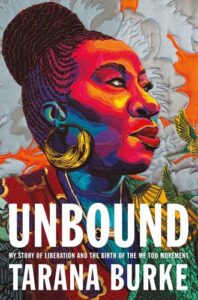
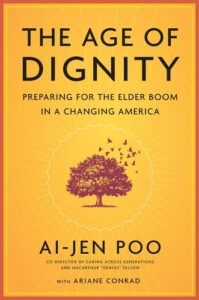
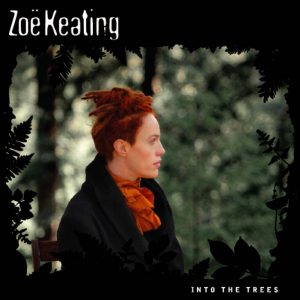



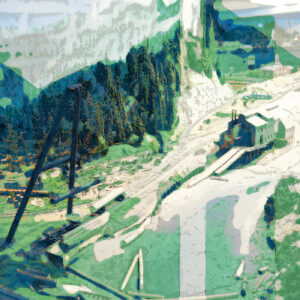
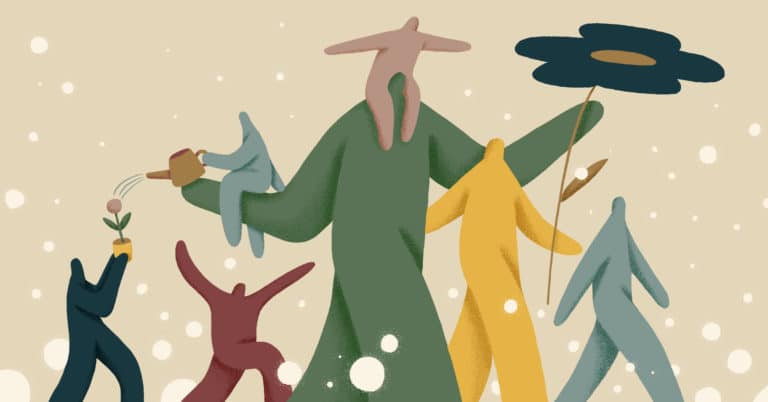
Reflections